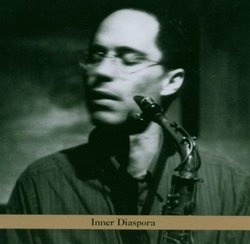| All Artists: Ned Rothenberg Title: Inner Diaspora Members Wishing: 1 Total Copies: 0 Label: Tzadik Original Release Date: 1/1/2006 Re-Release Date: 1/30/2007 Genres: Folk, International Music, Jazz, Pop, Classical Styles: Jewish & Yiddish, Avant Garde & Free Jazz, Jazz Fusion, Historical Periods, Modern, 20th, & 21st Century Number of Discs: 1 SwapaCD Credits: 1 UPCs: 702397811428, 0702397811497, 070239781149 |
Search - Ned Rothenberg :: Inner Diaspora
 | Ned Rothenberg Inner Diaspora Genres: Folk, International Music, Jazz, Pop, Classical
|
Larger Image |
CD Details |
CD ReviewsMuch to ponder in this remarkable music Jan P. Dennis | Monument, CO USA | 03/14/2007 (5 out of 5 stars) "The idea of an "inner Diaspora" seems too quintessentially post-modern to me to be completely satisfying. I mean, really, how can you be alienated from something you don't believe? Is the idea that the God of the universe acted on behalf of a certain people, the Jews, to draw them to himself and, thereby, draw all peoples to himself so outrageous that it can no longer be believed? Perhaps so, in face of the Holocaust. And that precipitates a kind of inner alienation, an interior scattering, as it were, leaving the individual suffering from a state of spiritual, emotional, cultural, and intellectual untethering. The question for such an individual is, How can I remain authentically Jewish without being religious? The answer is, you can't. Judaism is so wrapped up with the acts of G-d in history--the Exodus, the giving of the Law, the sacrificial system, Passover, the Day of Atonement, Purim, the Festival of Lights (which Jesus celebrated, by the way)--that to deny them or lose access to them almost erases the heart of Judaism. But to assert them as literally true, as I. B. singer did in a famous short story, is to risk marginalization by the arbiters of contemporary Judaism. Not being a Jew, I have no personal access to this dilemma. But I feel it in my heart, and I have a profound sympathy for anyone who finds him/herself in a condition of mere cultural Judaism.
Can this state of affairs be the matrix of important music expression? Certainly. One need only witness this and countless other discs on offer from Tzadik (the label of radical Judaism) that attest to conflicted cultural Judaism as a splendid milieu for musical statements not only of profound pathos but also great beauty. This disc is no exception. It literally reeks with heartfelt yearning for something thought to be forever lost, even as it assays the ground of existential alienation. As a Catholic Christian, I feel an especially strong link to my Elder Brothers in the Faith, be they alienated or not. Thus, this music opens out for me vast panoramas of glorious visions, even if they're somewhat vitiated by unbelief. OK, enough armchair philosophizing. On to the music. Leader Rothenberg is no stranger to Jewish-based world jazz. A couple of his earlier discs, Power Lines and Sync, Port of Entry, are some of my favorites. On this disc, he has nailed his entirely likable approach with a crack band (Jerome Harris, acoustic bass guitar, lap steel, and steel string guitar, and Samir Chatterjee, tabla, augmented by the formidable Mark Feldman, violin, and Erik Friedlander, cello) and a handful of very evocative songs. Definitely Middle-Eastern sounding, the music also exhibits Baltic and pan-Mediterranean sensibilities. I especially like the absolutely locked-in character consistently demonstrated by Feldman and Friedlander, especially prominent on the wrap-up of "Gilgulam," but generously scattered throughout this altogether remarkable disc. If you're on to Ned Rothenberg, you'll certainly want to acquire this disc. If you're not, this is a great entry point to his unique musical vision. Highly recommended." |

 Track Listings (6) - Disc #1
Track Listings (6) - Disc #1